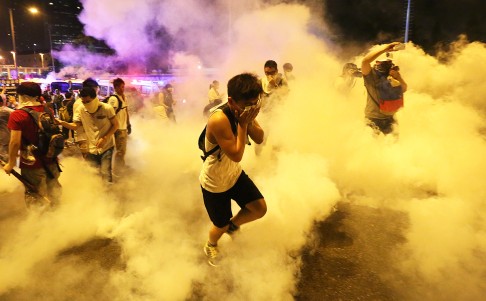AUSTIN CHIU IN LONDON AND DANNY LEE
PUBLISHED : Thursday, 23 October, 2014, 4:48am
UPDATED : Thursday, 23 October, 2014, 6:27pm
Hugo Swire reiterated that "the detailed arrangements for implementing [universal suffrage] are for the people of Hong Kong, and the governments of Hong Kong, and the People's Republic of China to determine". Photo: Sam Tsang
Britain said on Wednesday it was open to a ban on British tear gas exports to Hong Kong after police used it against pro-democracy protesters.
Foreign Office minister responsible for Hong Kong affairs Hugo Swire told MPs in a debate about recent events in Hong Kong, that high-level ministerial discussions between the Foreign Secretary and Business Secretary are likely to rule on the matter.
“The answer is, yes, we have previously licensed exports of tear gas to Hong Kong,” Swire said. “But we will certainly take the recent disturbances in Hong Kong into account when these matters are discussed.”
Chemring, the British manufacturer of tear gas sold to Hong Kong, previously indicated it would review its sales policy after 87 canisters were deployed to disburse pro-democracy protesters.
British MPs also focused on the rich-poor divide yesterday as London’s commitment to its former colony came under scrutiny for the second time in less than a week.
READ MORE: To view all the latest Occupy Central stories click here
Geoffrey Clifton-Brown, an MP and chairman of the Conservative Friends of the Chinese group, suggested the city’s young had been “left behind” by economic progress, and contrasted their fate with the rising middle class in mainland China.
“It seems odd that the government of the PRC [People’s Republic of China] want more and more poor people on the mainland to participate in the economic growth there, but are not yet permitting that to happen in Hong Kong,” he said.
The focus on the wealth gap comes days after Chief Executive Leung Chun-ying claimed democracy would see poor people – earning less than HK$14,000 a month – dominate the vote, meaning a free and fair election impossible to contest.
 Police first fired tear gas at protesters on September 28 after Occupy Central was officially declared. Photo: Sam Tsang
Police first fired tear gas at protesters on September 28 after Occupy Central was officially declared. Photo: Sam Tsang
However, Conservative MP Richard Graham, who organised the debate, criticised the Foreign Office’s defence of the National People’s Congress standing committee plan for universal suffrage.
He suggested links between so-called foreign forces and protesters “were well wide of the mark,” contrasting with support from London for the electoral plans.
“A new generation of Hongkongers: They were mostly born after the joint declaration. They are not ancient colonial sentimentalists or those left by dark foreign forces to create disturbance after the colonialists had gone, but a new generation with a different take on life from their predecessors,” Graham said, rallying round pro-democracy protesters. “They are more sure of their Hong Kong identity, less sure of their future prospects and less trustful of government.”
In recent years, Britain has shored up economic and trade ties with China – becoming increasingly reliant on Chinese investment and tourism plus lucrative UK exports to a new breed of Chinese middle class consumers.
Opposition Labour MP Barry Sheerman defended Beijing’s power as one Hong Kong should welcome.
“Those of us who care about China believe it to be a vital and energising influence in the world. Does [Graham] agree that there are serious signs of a positive change in the leadership in China? … This positive wind of change should give some reassurance to us and the inhabitants of Hong Kong,” Sheerman said.
Swire added that the British government was fully committed to the 1984 Sino-British Joint Declaration and had a “moral obligation” to Hong Kong and “legitimate interests” in the former colony’s stability.
He reiterated that Hong Kong’s future would be best served by a transition to universal suffrage, in line with the Basic Law, which met the aspirations of the people of Hong Kong, in the chief executive election. He also said that Hongkongers should be offered a “genuine choice”.
But the minister maintained that “the detailed arrangements for implementing [universal suffrage] are for the people of Hong Kong, and the governments of Hong Kong, and the People’s Republic of China to determine”.
Graham’s remarks in support of protesters and full universal suffrage in the debate angered the delegation of four Chinese embassy officials, according to sources. A Hong Kong Economic and Trade office representative joined the London-based diplomats at the debate.
In a debate last week on Hong Kong in the House of Lords, government spokesman William Wallace defended the policing of the protests and former Hong Kong governor David Wilson credited the police for checking the protests with “few serious incidents”, while praising protesters’ resolve.
http://m.scmp.com/news/hong-kong/article/1622427/british-mps-debate-hong-kong-protests